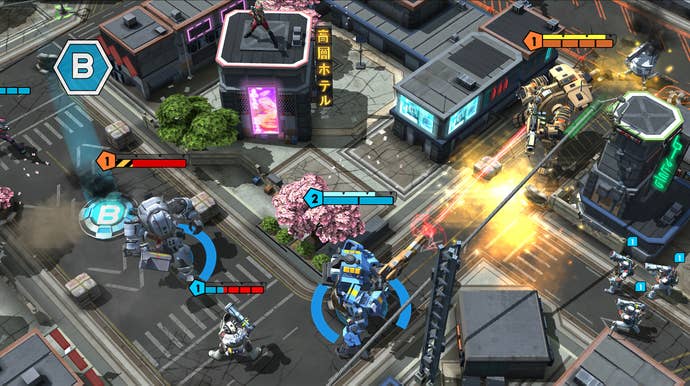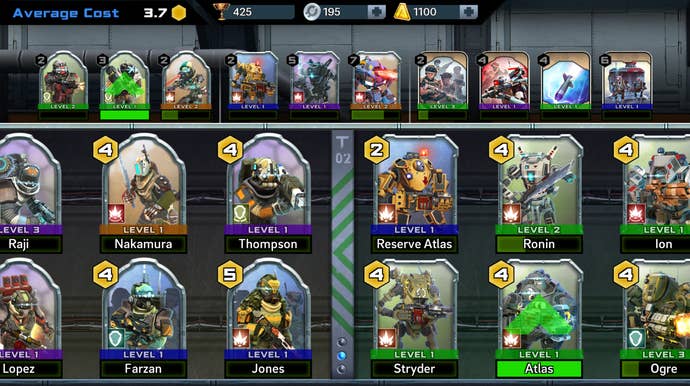Titanfall: Assault Doesn't Want to Be Another Pay-To-Win Mobile Game
Stand by for Titanfall (on your phones).
This article first appeared on USgamer, a partner publication of VG247. Some content, such as this article, has been migrated to VG247 for posterity after USgamer's closure - but it has not been edited or further vetted by the VG247 team.
In so many free-to-play mobile games, players are barred at every turn. Whether it's by in-game stamina, resources, or whatever else. In most smartphone experiences, a game often feels more free-to-be-shaken-up-for-cash than free-to-play.
Titanfall: Assault though, the upcoming Titanfall-themed real-time strategy game for iOS and Android from Particle City and Respawn, wants to break the trend. Releasing soon on August 10, Titanfall: Assault wants to be an RTS that doesn't gate players by how much money they're willing to throw at the game, but by their sheer skill and ability. In essence, Titanfall: Assault longs to be a mobile game that's actually fair to players. A mobile game that, perhaps most importantly, doesn't cause Titanfall proper fans to turn their nose up at it.
As Particle City CEO Larry Pacey tells me, the moment to moment in Titanfall: Assault is similar to what someone spectating a Titanfall match might see. From an overhead view, players see a dizzying array of hard points being captured and lost, as part-way into the match players summon Titans, and the dynamics of battle change in a flash. In Titanfall: Assault, you're still sort of controlling all the action at your fingertips, except in this game you're more of a general than a foot soldier. Like you were coaching and dictating every leap, every Titan summoning, every movement to a team.

"What we've captured inside Titanfall Assault is something that's much more fast and fluid and dynamic of a battle than you normally see in a mobile game. That's the richness that came with Titanfall and what you'd expect," said Pacey. "[Like] you have these pilots who are kind of the apex predators of the future battlefield, who are able to traverse buildings and hills and parkour along walls."
Titanfall: Assault, at its core, is almost a collect-a-thon card game. Different cards represent different pilots, each with their own strengths, weaknesses, and accompanying costs (energy costs, quickly used within the heat of a match). In addition, players can employ "burn cards," which are limited abilities for matches, like an EMP blast to stun nearby turrets and Titans. Players are also able to summon Titans a minute onwards deep in a battle, whether selecting the quick on its feet, sword-wielding Ronin or the flaming, devastating, more costly Scorch. The Titans in particular, Pacey noted, are a mixture of Titans from Titanfall 1, Titanfall 2, and new ones, giving Particle City and Respawn an opportunity to expand the universe.
During my time spent playing Titanfall: Assault, I was pleasantly surprised by it. (Pleasantly surprised is something I don't often say about RTS mobile games, honestly.) While it felt a bit too easy on the Normal (and obviously on Easy), Hard mode ramped up the difficulty to a satisfying degree. In one match as enemy AI overwhelmed the large turret at the base of my camp—where if yours is destroyed, you lose—I found myself dropping a Titan in to help defend in a frenzy. It wasn't enough in the end, but it was an example of the complicated dual win state at play: where players either win through accruing points through maintaining the map's three hard points, or successfully push through the enemy's defenses and take down their giant turret. In that scenario, I was ignoring the latter.

"There's a lot of [mobile] games where it's singularly about just countering what other people do," said Pacey. "And while that's definitely here, Titanfall Assault is really a lean forward game. Where you're trying to hold these points that are dynamic in the middle of the field. It's much more visceral, fast fluid game. More than people typically see in mobile."
Since Particle City and Respawn are sister companies—Particle City was formed by Pacey and Respawn's Vince Zampella with backing by Respawn and Nexon—Titanfall: Assault isn't the sort of shameless IP-tie in game to be shuffled off to the mobile abyss to become another frustrating cash grab (I am totally looking at you, Final Fantasy XV: A New Empire). Instead, care is seemingly going into the game. Whether that's care surrounding its gameplay ("Just like Respawn, the design process is about finding great gameplay first, and building everything around it.") or the Titan-stuffed world it inhabits.
"The universe is expansive, you're talking about this whole gold rush kind of mentality of mankind that has gone to space for these very rich resources and planets, and that's really the setting for Titanfall," said Pacey. Titanfall already posits a world in conflict, of multiple sides fighting things out. That setting translates easily to mobile. And even more so, its PvP mode Hard Point translates well too, even if the original game and mobile game's envisioning of Hard Point aren't precisely the same.
When Titanfall: Assault launches, it won't be the end for it. As Pacey encouraged, the select maps that will be available at launch (which unlock according to the players' in-game experience) won't be the end of the maps, just as Hard Point won't be the end of its game modes. But for a start, it's a strong one. I can see the maps growing tired over time, even if they each have their own unique quirks to make battle a bit more interesting (for instance, one has a zip-line right into enemy lines, another has tall buildings, prime for turrets).
But Titanfall: Assault isn't the sort of game for players to binge for hours on end. It's a mobile game through and through. A mobile game best experienced in small doses, whose nugget-sized matches and commitment may end up surprising both mobile RTS fans and Titanfall fans when it releases on devices on August 10.

